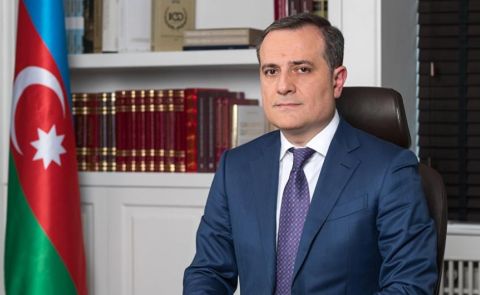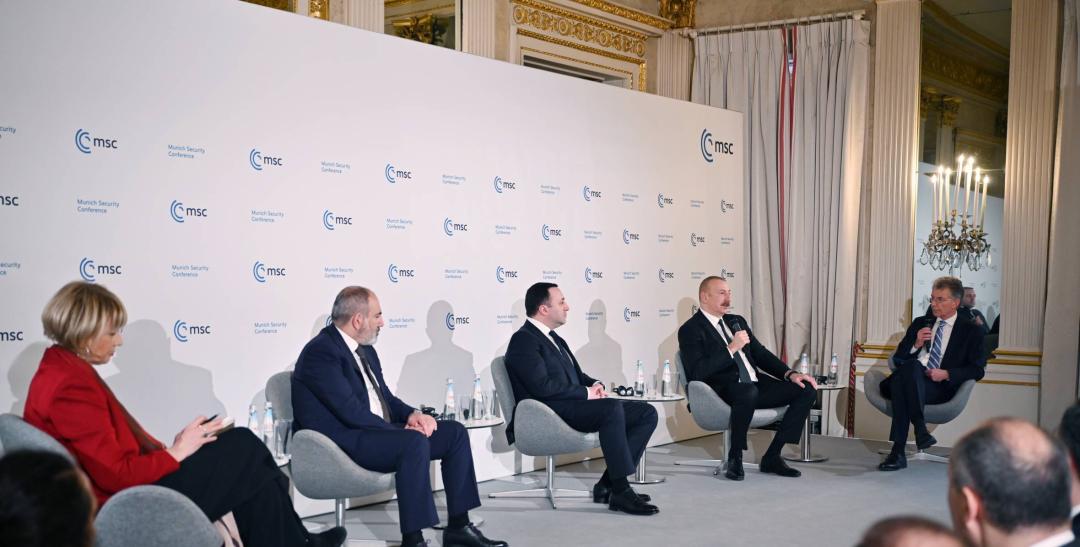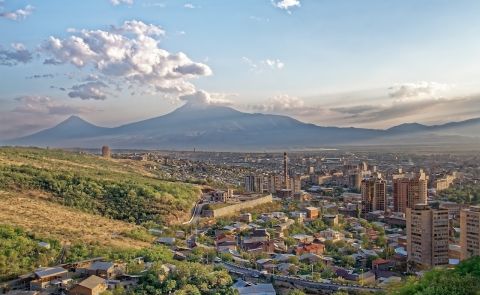
Ilham Aliyev and Nikol Pashinyan Participate in Munich Security Conference

The US Secretary of State, President of Azerbaijan, and Prime Minister of Armenia met in Munich
On February 18, a joint meeting of President of Azerbaijan Ilham Aliyev, Secretary of State of the United States of America Antony Blinken, and Prime Minister of Armenia Nikol Pashinyan was held in Munich, the press services of the President of Azerbaijan and the Prime Minister of Armenia reported. The meeting was also attended by US Assistant Secretary of State for European and Eurasian Affairs Karen Donfried, Secretary of State's Senior Adviser on Caucasus Negotiations Luis Bono, Assistant to the President of Azerbaijan Hikmet Hajiyev, Minister of Foreign Affairs Jeyhun Bayramov, Minister of Foreign Affairs of Armenia Ararat Mirzoyan, Secretary of the Security Council Armen Grigoryan.
Antony Blinken first thanked President Aliyev and Prime Minister Pashinyan. "We believe that Armenia and Azerbaijan have a truly historic opportunity to ensure lasting peace after more than 30 years of conflict. The parties themselves focused on the peace process through direct negotiations, as well as with the European Union and us. The United States stands ready to do everything in its power to support these efforts, whether with our friends, in a trilateral format like this one, or with other international partners," the Secretary of State said.
Aliyev's remarks after the trilateral meeting with Pashinyan
Following the joint meeting with US Secretary of State Antony Blinken and Prime Minister of Armenia, Nikol Pashinyan, President of the Republic of Azerbaijan Ilham Aliyev, was interviewed by TV channels in Munich.
Aliyev stated, "The meeting went well. I think it was constructive. Many issues were discussed, including the signing of the peace agreement between Armenia and Azerbaijan and the existence of the necessary conditions for the signing of the agreement. Of course, I reiterated my position. The key thing is that this peace agreement should be based on international norms and principles. Any provision about Karabakh is unacceptable. Azerbaijan’s position in this respect has been communicated. Three days ago, we received new responses to our proposals from Armenia. We are elaborating on them now. At first glance, there is progress in Armenia's position, but it is insufficient."
Regarding creating checkpoints along the border and the situation in the Lachin corridor, he added: "Of course, the situation on the Lachin-Khankendi [Stepanakert in Armenian] road was also discussed. I reiterated Azerbaijan's position that there is no question of any kind of blockade. More than 2,500 trucks and Red Cross vehicles have passed along the road since December 12, and if there had been a blockade, how could these vehicles have gotten through? In other words, this is an unfounded accusation against Azerbaijan, we are rejecting it, and I can say that this position was met with understanding in all the meetings I have had. The European Union understands our position as well. We rightfully demand that the illegal exploitation of our fields be stopped. Until this is achieved, I am sure that our social activists will not give up their honorable mission. I have tried to communicate this message as well today. I have also stated that it would be good if Armenia and Azerbaijan established checkpoints on the Armenian-Azerbaijan border bilaterally. We made this suggestion earlier and made it official today. Previously, this suggestion was communicated through unofficial channels. Armenia did not voice any position. They probably need some time to discuss it."
Ilham Aliyev attended a round table on energy security on the sidelines of the Munich Security Conference
On February 17, a round table themed - "Pipe Dreams: Future-Proofing Energy Security" was held on the sidelines of the Munich Security Conference. Ilham Aliyev attended the event.
Highlighting Azerbaijan's contribution to Europe's energy security, the head of state said that the increase in Azerbaijan's gas supply last year was a short-term contribution to Europe's energy security. The Azerbaijani President noted that the medium and long-term goal is the expansion of the Southern Gas Corridor proposed by Azerbaijan. President Ilham Aliyev underlined that by 2027, it is planned to increase gas transportation through TAP from the current 11 billion cubic meters to 20 billion cubic meters and via TANAP from 16 billion cubic meters to 31 billion cubic meters.
Saying that renewable energy has a unique role in cooperation between Azerbaijan and the European Union, President Ilham Aliyev pointed out that Azerbaijan had recently taken several essential steps in this field. The head of state underscored that several projects in this area are already being implemented in Azerbaijan. Various documents on energy production of up to 25 gigawatts have been signed. The President said this would allow the green energy produced by Azerbaijan to be exported to Europe in addition to domestic consumption, contributing to Europe's energy security in the medium and long term. President Ilham Aliyev underlined that Azerbaijan would continue to play an important role in Europe's energy security.
Meeting between Aliyev and Michel
On the same day, Ilham Aliyev met with Charles Michel, the President of the European Council.
The discussion focused on the progress of the normalization of relations between Azerbaijan and Armenia, negotiations for a peace treaty, and the Brussels peace process. President Ilham Aliyev affirmed Azerbaijan's support for the Brussels peace process. Charles Michel assured that the European Union would continue its efforts to normalize relations between Armenia and Azerbaijan, reach a peace treaty, and ensure stability and security in the South Caucasus.
Meeting between Aliyev and the Defense Minister of Israel
On February 17, the President of the Republic of Azerbaijan met with Yoav Gallant, the Minister of Defense of the State of Israel, in Munich.
President Ilham Aliyev congratulated Yoav Gallant on his appointment as the Defense Minister of Israel and welcomed the contacts and telephone conversations between him and Azerbaijan's Defense Minister. The President acknowledged that the relationship between Azerbaijan and Israel is amicable and founded on a partnership-based approach. He lauded the progress made in various areas of cooperation, particularly in defense and military-technical spheres. President Ilham Aliyev expressed his confidence that the opening of Azerbaijan's embassy in Israel soon will contribute more to the development of relations between the two countries.
During the meeting, Minister Yoav Gallant praised the advancement of relations between the two nations and recalled his visit to Azerbaijan, expressing admiration for the favorable conditions established for the Jewish community in the city of Guba. The discussion between the parties also encompassed other topics of shared interest.
Armenian PM Holds Meetings with Various Foreign Partners in Munich
Within the Munich Security Conference framework, Armenian PM Nikol Pashinyan held several meetings with European officials and partners. On February 17, on the sidelines of the Munich Security Conference, Armenian Prime Minister Nikol Pashinyan met with European Commission President Ursula von der Leyen.
The interlocutors discussed various issues related to Armenia-European Union cooperation. The parties exchanged ideas on the projects to be implemented in Armenia within the Economic and Investment Plan framework of the EU's Eastern Partnership.
Nikol Pashinyan emphasized that the EU is the main partner of Armenia in implementing institutional reforms and thanked for the assistance provided in that direction.
Ursula Von der Leyen highly appreciated the process of democratic reforms in Armenia and expressed the readiness of the EU to continue support programs for the country.
On February 17, Nikol Pashinyan had an informal meeting with the President of the Council of the European Union, Charles Michel. Pashinyan also with the President of Latvia, Egils Levits. He pointed to the institutional reforms in Armenia and emphasized the significance of the E.U.'s continued support for their effective implementation. Thoughts on the processes taking place in the South Caucasus region, including the Nagorno-Karabakh issue, were also discussed.
The developments in the region and the activities of the E.U.'s civilian mission in Armenia were also discussed with the Croatian PM Andrej Plenković.
Pashinyan had a meeting with former NATO Secretary General Anders Fogh Rasmussen. The developments in the South Caucasus region and the steps toward strengthening stability and peace were discussed.
In a meeting with the President of the European Investment Bank (EIB) Werner Hoyer in Munich, Pashinyan stressed that the projects carried out in collaboration with EIB are highly important for the business circles and citizens as they are aimed at financing the private sector and improving various infrastructure nodes. Werner Hoyer remarked that the EIB is ready to discuss the potential for implementing new projects in many directions with Armenian partners and assessed the cooperation with the Armenian government as effective.
Plenary session on "Moving Mountains? Building Security in the South Caucasus"
On February 18, a plenary session on "Moving Mountains? Building Security in the South Caucasus" was held as part of the Munich Security Conference. Ilham Aliyev, Nikol Pashinyan, Irakli Garibashvili, and OSCE Secretary General Helga Schmidt attended the event.
Moderator and Chairman of the Munich Security Conference Christoph Heusgen asked Aliyev: "How has Russia's invasion, the war against Ukraine, how has this affected your respective countries?"
Aliyev emphasized, "I would say that there was no direct impact on us. But definitely, the general geopolitical situation has changed completely and probably will not go back to the time before the Russian-Ukrainian war. So, we can see some disadvantages concerning trade cooperation with some traditional partners. At the same time, some advantages, especially with respect to connectivity projects. Azerbaijan, for many years invested in the creation of modern transportation and logistics, and infrastructure. And now, diversifying cargo transportation from Central Asia across Azerbaijan to Europe creates additional opportunities." He added: "And I think Azerbaijan and Armenia need to demonstrate that the transition from the long-lasting stand of mutual hatred and hostility must end. We are now working on a peace agreement between Armenia and Azerbaijan. Hopefully, we will conclude it sooner or later. And I think that could be a good example of how countries with serious historical disagreements can get together and turn the page of hostility."
Moderator asked Georgia' Prime Minister Irakli Garibashvili: "Georgia, of course, has these occupied territories Abkhazia, South Ossetia. And what is the effect now for your country from the side of Russia? How about the Geneva talks? Is there anything happening? How has how is this impacted you?"
Garibashvili answered, "Russia occupies our historical territories, Abkhazia and South Ossetia. Russia has two military bases on our territory. And since then, we have been facing lots of problems and challenges. But after we came to power in 2012, we have made lots of efforts to de-escalate the tension." He added: "You mentioned Geneva international discussion, this is the only platform we have right now with the Russians. And so therefore, I must repeat that this war must be stopped. We have seen this war in the effects of this war in our country in 2008."
Moderator also asked Garibashvili about Saakashvili's health and current situation. Garibashvili stated, "I want people to know that he arrived in Georgia. The idea of his comeback was to make another revolution in Georgia, to organize mass killings and bloodshed. He failed, and he ended up in jail. You mentioned the pictures and photos. I want to say that Mr. Saakashvili was a good actor. The Georgian government has been doing everything we can to maximum support."
Christoph Heusgen asked the same question on Russo-Ukrainian War Nikol Pashinyan. Pashinyan answered, "It creates new risks for our region. And it is very important to keep the international attention to our region as well because I think there are many risks to be managed. What is our approach to this whole situation?"
Regarding the humanitarian catastrophe in Türkiye, the Armenian head emphasized, "We see quite a positive reaction from the Turkish Government. We are ready to go forward because we believe that the establishment of diplomatic relations with Türkiye and the opening of our border will be very positive, not only in terms of the original situation but for the international situation as well."
The Armenian Prime Minister said about the Lachin corridor, "It's already 70 days that the Lachin corridor has been blocked. And now, unfortunately, we have a humanitarian crisis in Nagorno-Karabakh and an energetic crisis as well. It is the obligation of Azerbaijan and Russian peacekeepers to keep the Lachin corridor operable."
Ilham Aliyev also talked about the Lachin corridor protests: "The word Nagorno-Karabakh is no longer valid. This is the Russian word. 'Nagorno' means mountainous. And in Azerbaijan, there is no such administrative unit like Nagorno-Karabakh. Therefore, of course, I would like to ask our partners to respect Azerbaijan's sovereignty and constitution. There is a Karabakh region of Azerbaijan, where there is an Armenian population." Aliyev also slammed Ruben Vardanyan: "It was agreed with our international partners that there would be discussions on rights and securities of the Armenian minority in Karabakh. And we are ready to do it. But with those representatives of the Armenian community who lived, who were born, and who lived in Karabakh throughout their life. But not with the person who was exported from Russia to have the leading position in Karabakh. Maybe export is not the right word. I would probably prefer the word 'smuggled into.' Because nobody knows how he emerged in Karabakh and how he is trying and achieving to go back to Yerevan and from there to Moscow, then back to Yerevan, and then to Karabakh, this fact demonstrates that there is no blockade." Aliyev added: "And the best indicator of that was the new mandate the Armenian population gave Prime Minister. That was the mandate for peace."
Pashinyan stated, "I am proud that I have been able, our government was able, even after the devastating war, to have free, democratic elections in our country that was worldwide, acknowledged as free democratic, transparent and competitive. And as I said, from our point of view, the solution is a democracy, the solution is transparency, the solution is dialogue, and the solution is respect for all countries in our region. We're ready to work in that direction."
Pashinyan referred to Aliyev’s claim regarding the “destroyed mosques” in Karabakh as well. In this context, he mentioned: "In 2017, mosques were destroyed to build a road in Azerbaijan. During the USSR, 1560 mosques were destroyed. Churches and mosques were destroyed in Armenia during the USSR. Nagorno-Karabakh Armenians should not pay for the actions of the USSR. That is a very dangerous narrative. I am afraid that Azerbaijan wants to give a religious context to the conflict. No such context exists. The proof of this is that we have a Muslim minority, a functioning mosque in our country.”
Armenian PM expressed fierce criticism over the word “capitulation” used by the President of Azerbaijan, noting that the inflaming intolerance, hatred, and hostile rhetoric are against the peace agenda.
See Also


Nordic-Baltic Delegation Meets Armenian Leaders to Discuss Regional Cooperation and Peace

Azerbaijan Strengthens Energy Partnerships with Multiple Countries

BP Strengthens Presence in Azerbaijan’s Offshore Energy Sector

Netanyahu’s Letter to Aliyev: Mutual Trust, Solidarity Following Hamas Attacks, Facilitating Dialogue Between Israel and Türkiye

